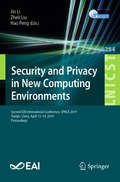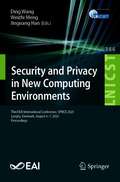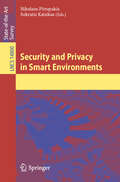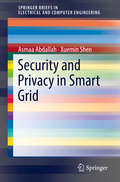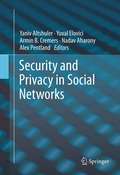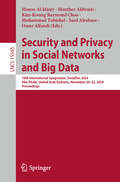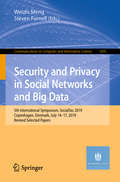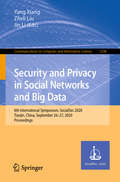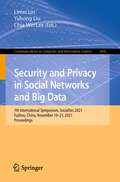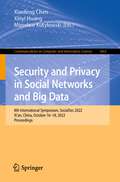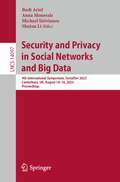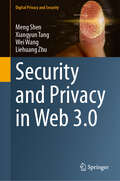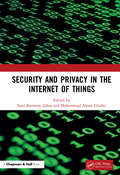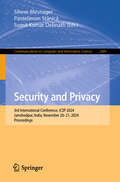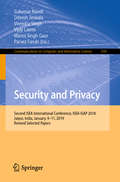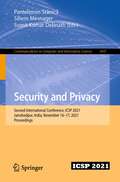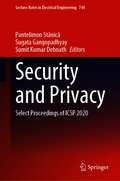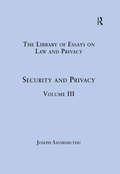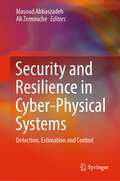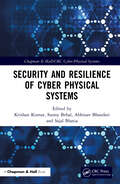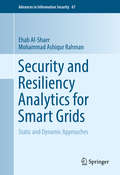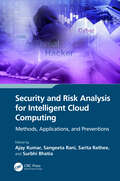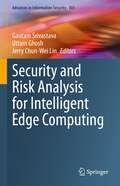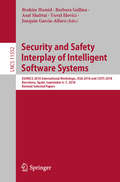- Table View
- List View
Security and Privacy in New Computing Environments: Second EAI International Conference, SPNCE 2019, Tianjin, China, April 13–14, 2019, Proceedings (Lecture Notes of the Institute for Computer Sciences, Social Informatics and Telecommunications Engineering #284)
by Jin Li Hao Peng Zheli LiuThis book constitutes the refereed proceedings of the 2nd EAI International Conference on Security and Privacy in New Computing Environments, SPNCE 2019, held in Tianjin, China, in April 2019. The 62 full papers were selected from 112 submissions and are grouped into topics on privacy and security analysis, Internet of Things and cloud computing, system building, scheme, model and application for data, mechanism and method in new computing.
Security and Privacy in New Computing Environments: Third EAI International Conference, SPNCE 2020, Lyngby, Denmark, August 6-7, 2020, Proceedings (Lecture Notes of the Institute for Computer Sciences, Social Informatics and Telecommunications Engineering #344)
by Ding Wang Jinguang Han Weizhi MengThis book constitutes the refereed proceedings of the Third International Conference on Security and Privacy in New Computing Environments, SPNCE 2020, held in August 2020. Due to COVID-19 pandemic the conference was held virtually. The 31 full papers were selected from 63 submissions and are grouped into topics on network security; system security; machine learning; authentication and access control; cloud security; cryptography; applied cryptography.
Security and Privacy in Smart Environments (Lecture Notes in Computer Science #14800)
by Sokratis Katsikas Nikolaos PitropakisThis volume gives readers an understanding of the multifaceted threats posed by the evolving cybersecurity landscape in smart environments, while also offering strategic insights into mitigative measures and proactive solutions. The chapters in the first part explain the current state of smart environments, shedding light on their complexities and vulnerabilities. The second part provides a fresh perspective on existing technologies and cyber challenges within the context of the modern era, offering novel insights and analyses. The third part is dedicated to exploring the intricacies of critical infrastructures. The concluding section offers a succinct overview of distributed ledger and privacy enhancement approaches, underscoring their potential role in fortifying cybersecurity measures. The contributors are among the leading researchers in the areas of smart environments, information security, and privacy, and the content will be of value to researchers in academia and industry, and security practitioners and policymakers.
Security and Privacy in Smart Grid (SpringerBriefs in Electrical and Computer Engineering)
by Xuemin Shen Asmaa AbdallahThis SpringerBrief addresses the main security concerns for smart grid, e.g., the privacy of electricity consumers, the exchanged messages integrity and confidentiality, the authenticity of participated parties, and the false data injection attacks. Moreover, the authors demonstrate in detail the various proposed techniques to secure the smart grid’s different communication networks and preserve the privacy of the involved. Over many years, power grid has generated electricity from central generators and distributed it in one direction from the generation stations to end-users; also, information is one directional so that the grid’s control center doesn’t get enough information about customers’ requirements and consequently can’t prevent electricity losses. So, the electricity grid is merged with information and communication technology to form smart grid. The main target of this incorporation is to connect different parties of power grid to exchange information about grid conditions and customers’ requirements, and consequently, improve the reliability and efficiency of electricity generation and distribution. That upgrade of the power grid exposes it to the cyber security threats that the communication networks suffer from, such as malicious attacks to forge the electricity consumption readings or price, extract personal information for residential consumers, such as daily habits and life style, or attack some grid’s resources and equipment availability using denial-of-service attacks. Also, novel threats are introduced in smart grid due to the power grid nature, such as false data injection attack, in which the adversary compromises several measurement units and injects false information about the grid conditions that mislead the grid’s control center to make wrong decisions for the grid and consequently impact on its stability and efficiency.
Security and Privacy in Smart Grids
by Yang XiaoPresenting the work of prominent researchers working on smart grids and related fields around the world, Security and Privacy in Smart Grids identifies state-of-the-art approaches and novel technologies for smart grid communication and security. It investigates the fundamental aspects and applications of smart grid security and privacy and reports
Security and Privacy in Social Networks
by Yuval Elovici Armin B. Cremers Nadav Aharony Yaniv Altshuler Alex PentlandSecurity and Privacy in Social Networks brings to the forefront innovative approaches for analyzing and enhancing the security and privacy dimensions in online social networks, and is the first comprehensive attempt dedicated entirely to this field. In order to facilitate the transition of such methods from theory to mechanisms designed and deployed in existing online social networking services, the book aspires to create a common language between the researchers and practitioners of this new area- spanning from the theory of computational social sciences to conventional security and network engineering.
Security and Privacy in Social Networks and Big Data: 10th International Symposium, SocialSec 2024, Abu Dhabi, United Arab Emirates, November 20–22, 2024, Proceedings (Lecture Notes in Computer Science #15565)
by Kim-Kwang Raymond Choo Saed Alrabaee Monther Aldwairi Mohammad Tubishat Mousa Al-Kfairy Omar AlfandiThis book LNCS 15565 constitutes the referred proceedings of the 10th International Symposium on Security and Privacy in Social Networks and Big Data, SocialSec 2024, held in Abu Dhabi, United Arab Emirates, during November 20–22, 2024. The 8 full papers and 2 short papers were carefully reviewed and selected from 22 submissions. The conference focus on Analysis of Social Media Perspectives, Privacy and Security Issues, Machine Learning and Intelligent Systems.
Security and Privacy in Social Networks and Big Data: 5th International Symposium, SocialSec 2019, Copenhagen, Denmark, July 14-17, 2019, Revised Selected Papers (Communications in Computer and Information Science #1095)
by Steven Furnell Weizhi MengThis book constitutes revised and selected papers from the 5th International Symposium on Security and Privacy in Social Networks and Big Data, SocialSec 2019, held in Copenhagen, Denmark, in July 2019. The 18 full papers and 3 short papers presented in this volume were carefully reviewed and selected from a total of 76 submissions. The papers in the volume cover a broad range of topics on security in Internet-of-things, Social Networks, User Authentication, Algorithm design, Artificial Intelligence, and Big Data.
Security and Privacy in Social Networks and Big Data: 6th International Symposium, SocialSec 2020, Tianjin, China, September 26–27, 2020, Proceedings (Communications in Computer and Information Science #1298)
by Jin Li Yang Xiang Zheli LiuThis book constitutes revised and selected papers from the 6th International Symposium on Security and Privacy in Social Networks and Big Data, SocialSec 2020, held in Tianjin, China, in September 2020. The 38 full papers presented in this volume were carefully reviewed and selected from a total of 111 submissions. The papers are organized according to the topical sections on big data security; social networks; privacy-preserving and security.
Security and Privacy in Social Networks and Big Data: 7th International Symposium, SocialSec 2021, Fuzhou, China, November 19–21, 2021, Proceedings (Communications in Computer and Information Science #1495)
by Chia-Wei Lee Limei Lin Yuhong LiuThis book constitutes revised and selected papers from the 7th International Symposium on Security and Privacy in Social Networks and Big Data, SocialSec 2021, held in Fuzhou, China, in November 2021.The 16 full papers presented in this volume were carefully reviewed and selected from a total of 41 submissions. Such themes as privacy protection, security of AI, mobile social networks, Big Data system, applied cryptography, and others are covered in the volume.The papers are organized in the following topical sections: Applied Cryptography for Big Data; Big Data System Security; Forensics in Social Networks and Big Data; Privacy Protection in Social Networks; Security and Privacy in Big Database; Security of AI; Trust and Reputations in Social Networks.
Security and Privacy in Social Networks and Big Data: 8th International Symposium, SocialSec 2022, Xi'an, China, October 16–18, 2022, Proceedings (Communications in Computer and Information Science #1663)
by Xinyi Huang Xiaofeng Chen Mirosław KutyłowskiThis book constitutes the proceedings of the 8th International Symposium on Security and Privacy in Social Networks and Big Data, SocialSec 2022, which took place in Xi'an, China, in October 2022.The 23 papers presented in this volume were carefully reviewed and selected from 103 submissions. The papers were evaluated on the basis of their significance, novelty, technical quality, as well as on their practical impact or their level of advancement of the field’s foundations. They were organized in topical sections as follows: Cryptography and its applications; Network security and privacy protection; Data detection; Blockchain and its applications.
Security and Privacy in Social Networks and Big Data: 9th International Symposium, SocialSec 2023, Canterbury, UK, August 14–16, 2023, Proceedings (Lecture Notes in Computer Science #14097)
by Shujun Li Anna Monreale Budi Arief Michael SirivianosThis book constitutes the proceedings of the 9th International Symposium on Security and Privacy in Social Networks and Big Data, SocialSec 2023, which took place in Canterbury, UK, in August 2023.The 10 full papers and 4 short papers presented in this volume were carefully reviewed and selected from 29 submissions. They were organized in topical sections as follows: information abuse and political discourse; attacks; social structure and community; and security and privacy matters.Papers "Data Reconstruction Attack Against Principal Component Analysis" and "Edge local Differential Privacy for Dynamic Graphs" are published Open Access under the CC BY 4.0 License.
Security and Privacy in Web 3.0 (Digital Privacy and Security)
by Wei Wang Liehuang Zhu Meng Shen Xiangyun TangWeb 3.0 is the next generation of the Internet built on decentralized technologies such as blockchain and cryptography. It is designed to address issues encountered in the previous generation of the Internet such as imbalanced distribution of interests, monopoly of platform resources, and leakage of personal privacy. This book explores the challenges and solutions related to ensuring security and privacy in the context of the evolving Web 3.0 architecture. Web 3.0 represents the next generation of the web, characterized by decentralized networks, blockchain technology, and enhanced user control over data. As Web 3.0 evolves, the focus on addressing security and privacy concerns becomes increasingly crucial. This book provides a comprehensive understanding of the security and privacy issues specific to Web 3.0 and offers practical defense frameworks and methods to mitigate these challenges. This book is dedicated to the specific aspects of security and privacy in Web 3.0, from introducing the architecture and addressing the inherent issues to presenting innovative methods for privacy-preserving computing, user behavior identification, and abnormal transaction detection. It is of particular interest to researchers in the field of Web 3.0, blockchain, and network security, as it summarizes the security and privacy concerns in Web 3.0 and brings a number of innovative technologies and practical solutions to protect sensitive data and maintain user privacy in Web 3.0 environments, equipping researchers with the knowledge necessary to design secure and privacy-aware applications and systems in Web 3.0.
Security and Privacy in the Internet of Things
by Syed Rameem Zahra Mohammad Ahsan ChishtiThis book provides a comprehensive study of the security and privacy research advancements in Internet of Things (IoT). The book lays the context for discussion by introducing the vulnerable intrinsic features of IoT. By providing a comprehensive discussion of the vulnerable features, the book highlights the problem areas of IoT related to security and privacy. • Covers all aspects of security • Algorithms, protocols and technologies used in IoT have been explained and the security flaws in them analyzed with solutions • Discusses ways for achieving better access control and trust in the IoT ecosystem • Contributes exhaustive strategic plans to deal with security issues of IoT • Gathers contributions from leading-edge researchers from academia and industry Graduates, researchers, people from the industry and security professionals who want to explore the IoT security field will find this book useful. The book will give an in-depth insight in to what has happened, what new is happening and what opportunities exist in the field.
Security and Privacy: 3rd International Conference, ICSP 2024, Jamshedpur, India, November 20–21, 2024, Proceedings (Communications in Computer and Information Science #2489)
by Sihem Mesnager Pantelimon Stănică Sumit Kumar DebnathThis book constitutes the refereed proceedings of the Third International Conference on Security and Privacy, ICSP 2024, held in Jamshedpur, India, during November 20–21, 2024. The 12 full papers and 1 short paper included in this book were carefully reviewed and selected from 39 submissions. They were organized in topical sections as follows: Cryptanalysis and Other Attacks; Boolean Functions; Authentication and authorization, Cyber-physical systems security, Privacy-preserving technologies; Blockchain and Cryptocurrency, IoT security and privacy, Database security; Quantum Cryptography.
Security and Privacy: Second ISEA International Conference, ISEA-ISAP 2018, Jaipur, India, January, 9–11, 2019, Revised Selected Papers (Communications in Computer and Information Science #939)
by Manoj Singh Gaur Virendra Singh Sukumar Nandi Devesh Jinwala Vijay Laxmi Parvez FarukiThis book constitutes the refereed proceedings of the Second International Conference on Security and Privacy, ISEA-ISAP 2018, held in Jaipur, India, in January 2019. The conference was originally planned to be held in 2018 which is why the acronym contains "2018". The 21 revised full papers presented were carefully reviewed and selected from 87 submissions. The papers are organized in topical sections: authentication and access control, malware analysis, network security, privacy preservation, secure software systems and social network analytics.
Security and Privacy: Second International Conference, ICSP 2021, Jamshedpur, India, November 16–17, 2021, Proceedings (Communications in Computer and Information Science #1497)
by Sihem Mesnager Pantelimon Stănică Sumit Kumar DebnathThis book constitutes the refereed proceedings of the Second International Conference, ICSP 2021, held in Jamshedpur, India, in November 2021. The 10 full papers were carefully reviewed and selected from 44 submissions. The contributions are organized in the following blocks: Cryptanalysis and other attacks; Symmetric cryptography and hash functions; Mathematical foundations of cryptography; Embedded systems security; Security in hardware; Authentication, Key management, Public key (asymmetric) techniques, and Information-theoretic techniques.
Security and Privacy: Select Proceedings of ICSP 2020 (Lecture Notes in Electrical Engineering #744)
by Pantelimon Stănică Sugata Gangopadhyay Sumit Kumar DebnathThis book consists of refereed selected papers from the International Conference on Security & Privacy – ICSP 2020. The book is focused on the state-of-the-art developments of network security, secure cryptographic protocols, post-quantum cryptography, quantum cryptography, block-chain and cryptocurrency, IoT security and privacy, cloud security, machine learning in cybersecurity, and other disciplines related to security and privacy. In this book, a wide variety of basic security primitives are discussed along with recent developments in some advanced topics like functional encryption, two-party/multi-party computation, bitcoin, cryptocurrency, and post-quantum security.
Security and Privacy: Volume III (The Library of Essays on Law and Privacy #3)
by Joseph SavirimuthuDuring the last decade in particular the levels of critical engagement with the challenges posed for privacy by the new technologies have been on the rise. Many scholars have continued to explore the big themes in a manner which typifies the complex interplay between privacy, identity, security and surveillance. This level of engagement is both welcome and timely, particularly in a climate of growing public mistrust of State surveillance activities and business predisposition to monetize information relating to the online activities of users. This volume is informed by the range of discussions currently conducted at scholarly and policy levels. The essays illustrate the value of viewing privacy concerns not only in terms of the means by which information is communicated but also in terms of the political processes that are inevitably engaged and the institutional, regulatory and cultural contexts within which meanings regarding identity and security are constituted.
Security and Resilience in Cyber-Physical Systems: Detection, Estimation and Control
by Masoud Abbaszadeh Ali ZemoucheThis book discusses the latest advances in cyber-physical security and resilience of cyber-physical systems, including cyber-attack detection, isolation, situation awareness, resilient estimation and resilient control under attack. It presents both theoretical results and important applications of the methods. Security and Resilience in Cyber-Physical Systems begins by introducing the topic of cyber-physical security, covering state-of-the-art trends in both theory and applications, as well as some of the emerging methodologies and future directions for research. It then moves on to detail theoretical methods of attack detection, resilient estimation and control within cyber-physical systems, before discussing their various applications, such as power generation and distribution, autonomous systems, wireless communication networks and chemical plants. Focusing on the detection of and accommodation to cyber-attacks on cyber-physical systems, and including both estimation and artificial-intelligence-based methods, this book will be of interest to researchers, engineers and graduate students within the fields of cyber-physical security and resilient control.
Security and Resilience of Cyber Physical Systems (Chapman & Hall/CRC Cyber-Physical Systems)
by Krishan Kumar, Sunny Behal, Abhinav Bhandari and Sajal BhatiaIn this era of 5G digital communication, the implementation of industry 4.0 is the need of the hour. The main aim of this industrial revolution is to completely automate the industry for better productivity, correct decision making and increased efficiency. All the concepts of industry 4.0 can only be implemented with the help of Cyber Physical System aka CPS. This is a smart system in which complete mechanism is monitored and controlled by computer-based algorithms. Confidentiality, Integrity and Availability are the three major concern for providing the add on security to any organization or a system. It has become a biggest challenge among the security professionals to secure these cyber physical systems. Hackers and bad guys are planning various kinds of attacks on daily basis on these systems. This book addresses the various security and privacy issues involved in the cyber physical system. There is need to explore the interdisciplinary analysis to ensure the resilience of these systems including different types of cyber threats to these systems. The book highlights the importance of security in preventing, detecting, characterizing and mitigating different types of cyber threats on CPS. The book offers a simple to understand various organized chapters related to the CPS and their security for graduate students, faculty, research scholars and industry professionals. The book offers comprehensive coverage of the most essential topics, including: Cyber Physical Systems and Industrial Internet of Things (IIoT) Role of Internet of Things and their security issues in Cyber Physical Systems. Role of Big data analytic to develop real time solution for CPS. DDoS attacks and their solutions in CPS. Emulator Mininet for simulating CPS Spark-based DDoS Classification System for Cyber-Physical Systems
Security and Resiliency Analytics for Smart Grids
by Ehab Al-Shaer Mohammad Ashiqur RahmanThis book targets the key concern of protecting critical infrastructures such as smart grids. It explains various static and dynamic security analysis techniques that can automatically verify smart grid security and resiliency and identify potential attacks in a proactive manner. This book includes three main sections. The first presents the idea of formally verifying the compliance of smart grid configurations with the security and resiliency guidelines. It provides a formal framework that verifies the compliance of the advanced metering infrastructure (AMI) configurations with the security and resiliency requirements, and generates remediation plans for potential security violations. The second section covers the formal verification of the security and resiliency of smart grid control systems by using a formal model to analyze attack evasions on state estimation, a core control module of the supervisory control system in smart grids. The model identifies attack vectors that can compromise state estimation. This section also covers risk mitigation techniques that synthesize proactive security plans that make such attacks infeasible. The last part of the book discusses the dynamic security analysis for smart grids. It shows that AMI behavior can be modeled using event logs collected at smart collectors, which in turn can be verified using the specification invariants generated from the configurations of the AMI devices. Although the focus of this book is smart grid security and resiliency, the included formal analytics are generic enough to be extended to other cyber-physical systems, especially those related to industrial control systems (ICS). Therefore, industry professionals and academic researchers will find this book an exceptional resource to learn theoretical and practical aspects of applying formal methods for the protection of critical infrastructures.
Security and Risk Analysis for Intelligent Cloud Computing: Methods, Applications, and Preventions
by Ajay Kumar Surbhi Bhatia Sangeeta Rani Sarita RatheeThis edited book is a compilation of scholarly articles on the latest developments in the field of AI, Blockchain, and ML/DL in cloud security. This book is designed for security and risk assessment professionals, and to help undergraduate, postgraduate students, research scholars, academicians, and technology professionals who are interested in learning practical approaches to cloud security. It covers practical strategies for assessing the security and privacy of cloud infrastructure and applications and shows how to make cloud infrastructure secure to combat threats and attacks, and prevent data breaches. The chapters are designed with a granular framework, starting with the security concepts, followed by hands-on assessment techniques based on real-world studies. Readers will gain detailed information on cloud computing security that—until now—has been difficult to access. This book: • Covers topics such as AI, Blockchain, and ML/DL in cloud security. • Presents several case studies revealing how threat actors abuse and exploit cloud environments to spread threats. • Explains the privacy aspects you need to consider in the cloud, including how they compare with aspects considered in traditional computing models. • Examines security delivered as a service—a different facet of cloud security.
Security and Risk Analysis for Intelligent Edge Computing (Advances in Information Security #103)
by Jerry Chun-Wei Lin Uttam Ghosh Gautam SrivastavaThis book offers the latest research results in security and privacy for Intelligent Edge Computing Systems. It presents state-of-the art content and provides an in-depth overview of the basic background in this related field. Practical areas in both security and risk analysis are addressed as well as connections directly linked to Edge Computing paradigms. This book also offers an excellent foundation on the fundamental concepts and principles of security, privacy and risk analysis in Edge Computation infrastructures. It guides the reader through the core ideas with relevant ease. Edge Computing has burst onto the computational scene offering key technologies for allowing more flexibility at the edge of networks. As Edge Computing has evolved as well as the need for more in-depth solutions in security, privacy and risk analysis at the edge. This book includes various case studies and applications on Edge Computing. It includes the Internet of Things related areas, such as smart cities, blockchain, mobile networks, federated learning, cryptography and cybersecurity. This book is one of the first reference books covering security and risk analysis in Edge Computing Systems. Researchers and advanced-level students studying or working in Edge Computing and related security fields will find this book useful as a reference. Decision makers, managers and professionals working within these fields will want to purchase this book as well.
Security and Safety Interplay of Intelligent Software Systems: ESORICS 2018 International Workshops, ISSA 2018 and CSITS 2018, Barcelona, Spain, September 6–7, 2018, Revised Selected Papers (Lecture Notes in Computer Science #11552)
by Yuval Elovici Asaf Shabtai Joaquin Garcia-Alfaro Barbara Gallina Brahim HamidThis book constitutes the thoroughly refereed post-conference proceedings of the International Workshop on Interplay of Security, Safety and System/Software Architecture, CSITS 2018, and the International Workshop on Cyber Security for Intelligent Transportation Systems, ISSA 2018, held in Barcelona, Spain, in September 2018, in conjunction with the 23rd European Symposium on Research in Computer Security, ESORICS 2018.The ISSA 2018 workshop received 10 submissions from which 3 full papers and 1 short paper were accepted. They cover topics such as software security engineering, domain-specific security and privacy architectures, and automative security. In addition, an invited paper on safety and security co-engineering intertwining is included. The CSITS 2018 workshop received 9 submissions from which 5 full papers and 1 short paper were accepted. The selected papers deal with car security and aviation security.
